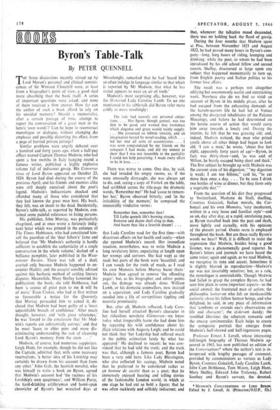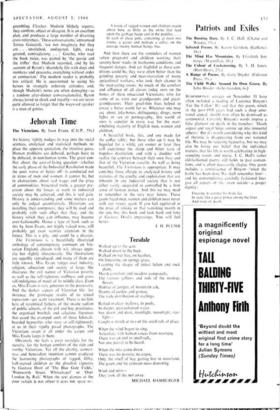Byron's Table -Talk
By PETElt QUENNELL
MEIE fierce discussions recently stirred up by I Lord Moran's personal and clinical reminis- cences of Sir Winston Churchill were, at least from a biographer's point of view, a good deal more absorbing than the book itself. A series of important questions were asked; and none of them received a firm answer. How far can the author of such a book afford to rely on his unaided memory? Should a memorialist, after a certain passage of time, attempt to report the conversation of a great man in the hero's 'own words'? Can he hope to reconstruct monologue or dialogue, without changing ,the emphasis and possibly distorting the effect, from a page of hurried private jottings?
Similar problems were angrily debated over a hundred and forty years ago, when a half-pay officer named Captain Thomas Medwin, who had spent a few months in Italy hanging round a famous writer, published a highly explosive volume full of indiscreet gossip. His Conversa- tions of Lord Byron appeared on October 23, 1824. Byron had died during the course of the previous April; and his friends and enemies alike were still deeply exercised about the poet's legend. Medwin's indiscretions shocked and offended many of those who considered that they had known the great man best. His book, they felt, was an insult to the dead. Incidentally, Byron's table-talk, as reported by Medwin, con- tained some painful references to living persons.
His publisher, John Murray, was particularly chagrined, and at once wrote a furiously indig- _ nant letter which was printed in the columns of The Times. Hobhouse, who had constituted him- self the guardian of the 'dear fellow's' fame and believed that `Mr Medwin's authority is hardly sufficient to establish the authenticity of a single conversation in the whole volume,' dashed off a bellicose pamphlet, later published in the West- minster Review. There was talk of a duel, averted only because Medwin happened to en- counter Hazlitt; and the essayist sensibly advised against this barbaric method of settling literary disputes. Meanwhile, Mary Shelley lamented the publication; the book, she told Hobhouse, had been 'a source of great pain to me & will be of more.' Even Croker, who had at first written so favourable a notice for the Quarterly that Murray persuaded him to cancel it, de- clared that Medwin had been guilty of a 'most unjustifiable breach of confidence.' After much thought, however, and 'with great reluctance,' lie was 'forced to the conclusion that Mr Med- win's reports are substantially correct,' and that he must 'leave to abler pens and more dis- criminating understanding the task of cleansing Lord Byron's memory from the stain. . .
Medwin, of course, had numerous supPorters. Leigh Hunt, for example, though he did not like the Captain, admitted that, with some necessary reservations, 'a better idea of his Lordship may certainly be drawn from his account than from any other.' John Galt, the Scottish novelist, who was himself to write a book on Byron, agreed that Medwin's account had 'the raciness of his Lordship's own quaintness'; and William Parry, the hard-drinking artilleryman and hord-spun chronicler of Byron's last wretched days at
Missolonghi, remarked that he had 'heard him so often indulge in language similar to that which is reported by Mr Medwin, that what he has stated appears to wear an air of truth.'
Medwin's most surprising ally, however, was the ill-starred Lady Caroline Lamb. To no one mentioned in his table-talk did Byron refer more coldly or more insultingly: The lady had scarcely any personal attrac- tions. . . . Her figure, though genteel, was too thin to be good, and wanted that roundness which elegance and grace would vainly supply. . . . She possessed an infinite vivacity, and an imagination heated by novel-reading, which . . . led her into all sorts of eccentricities. . . . I was soon congratulated by my friends on the conquest I had made, and did my utmost to shew that I was not insensible to the partiality I could not help perceiving. I made every effort to be in love. . . .
There was worse to come. One day, he said, she had invaded his empty rooms, as, if she were unusually distraught, she was always apt to do, and, seeing a copy of Vathek on the table, had scribbled across the title-page the dramatic words, 'Remember me!' He had 'cause to remem- ber her,' Byron observed bitterly; and 'in the irritability of the moment,' he composed the memorably vindictive verses:
Remember thee, remember thee! Till Lethe quench life's burning stream, Remorse and shame shall cling to thee, And haunt thee like a feverish dream! . . .
that Lady Caroline read for the first time—with disastrous effects on her health and sanity—when she opened Medwin's record. Her immediate reaotion, nevertheless, was to write Medwin a long revelatory letter, expatiating at length upon her wrongs and sorrows. She had wept as she read; but parts of the book were 'beautiful; and I can vouch for the truth of much, as I read his own Memoirs before Murray burnt them.' Medwin then agreed to remove 'the offending pages'; but, as his biographer and editor points out, the damage was already done. William Lamb, or his domestic counsellors, now insisted on a separation; and Lady Caroline gradually receded into a life of surreptitious tippling and neurotic prdmiscuity.
But, after all, Medwin reflected, Lady Caro- line had herself attacked Byron's character in her ridiculous novelette Glenarvon—we know today what irreparable harm she had done him by repeating his wild confidences about his illicit relations with Augusta Leigh; and he could not think that 'her Ladyship had suffered much in the public estimation lately by what has appeared.' He declined to recant; he was con- vinced that he had told the truth; and the truth was that, although a famous poet, Byron had been a very odd hero. Like Lady Blessington, who also collected his sayings, Medwin noted that he preferred to be considered rather as an homme de societe than as g poet; that he immensely enjoyed hearing and telling stories of the fashionable London world, in which at one stage he had cut so bold a figure; that he was often recklessly and selfishly indiscreet; and
that, whenever the talkative mood descended, there was no holding back the flood of gossip.
During the four months that Medwin spent at Pisa, between November 1821 and August 1822, he had passed many hours in Byron's com- pany—long, long hours of riding, lounging and drinking; while the poet, to whom he had been introduced by his old school fellow and second cousin, Shelley, discoursed at large upon any subject that happened momentarily to turn up, from English poetry and Italian politics to his former love affairs.
The result was a perhaps not altogether edifying but uncommonly useful and entertaining work. Nowhere else do we find so vivid an account of Byron in his middle phase, after he had escaped from the exhausting demands of the harum-scarum life he had led at Venice among the dissipated inhabitants of the Palazzo Mocenigo, and before he had determined on the heroic course of action that would carry him away towards a lonely end. During the interim, he felt that he was growing old; and, indeed, Medwin noticed, the man who prized youth above all other things had begun to look old. 'I saw a man,' he wrote, 'about five feet eight, apparently forty years of age'—Byron, in fact, was thirty-three—and, 'as was said of Milton, he barely escaped being short and thick.' The first subject he brought up with Medwin was the current state of his digestion; "my digestion is weak; I am too bilious," said he, "to eat More than once a day. . . . To be sure I drink two bottles of wine at dinner, but they. form only a vegetable diet." ' From the question of his diet they progressed to Switzerland, Madame de Stael, duelling, Countess Guiccioli, Italian morals, the Car- bonari and his own Memoirs, 'very incoherent, written in a very loose and familiar style'—and so on, day after day, at a rapid, unrelaxing pace, as Byron travelled back into the past and dealt, more lightly and casually, with his opinions of the present period. Oratio recta is employed throughout the book. But are these really Byron's words we hear? Well, it is difficult to resist the impression that Medwin, besides being a good listener, was a phenomenally good reporter. In Byron's letters and journals we have heard the same voice; again and again, as we read Medwin, we recognise its tone and accent. Sometimes it is slightly blurred in reproduction—Medwin's ear was not invariably sensitive; but, as a rule, the monologue is unmistakable. Though Medwin had failed to grasp the complete Byron, he had seen him plain in some important aspects—as the social animal; the frustrated man of action; the philosophic looker-on who felt an inexhaustible curiosity about his fellow human beings, and who delighted, he said, in any piece of information that 'confirms or extends one's observations on life and character'; the ci-devant dandy; the troubled libertine; the reluctant romantic and the uneasy sentimentalist. Each helps to create the composite portrait that emerges from Medwin's half-shrewd and half-ingenuous pages.
Professor Ernest J. Lovell, whose interesting full-length biography of Thomas Medwin ap- peared in 1963, has now published an edition of the Conversations* where the author's text is in- terspersed with lengthy passages of comment, provided by commentators as various as Lady Byron, Countess Guiccioli, Lady Caroline Lamb, John Cam Hobhouse, Tom Moore, Leigh Hunt, Mary Shelley, Edward John Trelawny, Robert Southey and Byron's servant, the devoted,
* MEOWIN'S CONVERSATIONS OF LORD BYRON.
Edited by J. Lovell, Jr. (Princeton/O.U.P., 52s.) grumbling Fletcher. Medwin blithely reports; they confirm, object or disagree. It is an excellent plan, and produces a large number of diverting cross-references. 'These conversations,'announced Teresa Guiccioli, 'are not imaginary but they are . . . unstitched, undigested, light, exag- gerated, contradictory. . . .' Goethe, who read the book twice, was pained by 'the gossip and the trifles' that Medwin recorded, and by his account of Byron's 'disorderly life with dogs and monkeys and peacocks, everything without order or connection.' The modern reader is probably less critical. He is accustomed to seeing his heroes in strangely unheroic attitudes; and, though Medwin's notes are often damaging—as a random after-dinner conversationalist, Byron always loved to shock and mystify—we are never quite allowed to forget that the wayward speaker is a man of genius.






























 Previous page
Previous page